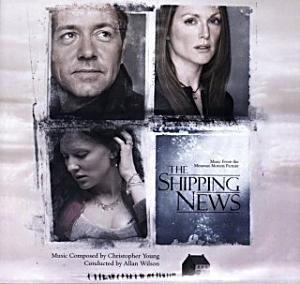Christopher YOUNG
The Shipping News
Uilean pipes: Robert White; Penny Whistle: Tony Hinnegan; Hurdy Gurdy: Nigel Eaton; Fiddle: Dermot Crehan; Harps: Hugh Webb & Miriam Keogh; Guitars & Psalteries: Robin Jeffery & Stuart Hall
The Philharmonia Orchestra conducted by Allan Wilson.
MILAN 74321-925532 [46:14]

Christopher Young's atmospheric score beautifully supports the film's breathtaking photography of the Newfoundland coastline and fishing villages. Through steely, wiry figures and swirling strings, you get a sense of thick blizzards, penetrating chill, limitless dark blue/black seascapes and the isolation of this forbidding hostile environment. But when are we going to move on from the Gaelic music cliché? Once again we have a score dominated by Irish Uilean pipes, hurdy gurdies etc plus drumming rhythms that might suggest Scottish pride. (Presumably the area of Newfoundland, in which the film is set, was settled by Irish/Scottish immigrants? But must film music composers persist on the easy option, the too well-trodden route)
I will confess I groaned inwardly as I listened to how this idiom, drone-like, dominated the opening titles music when I saw the film. Fortunately, Young uses his basic harmonies and rhythmic patterns and Gaelic instrumentation (with additional, sparingly used, but well-chosen plashes of colourful orchestrations) most imaginatively to flesh out the characters of the isolated fishing community and to depict their desolate yet beautiful surroundings. The music for the most part is slow-moving and introspective, once or twice alleviated by more lively folk dance material. Occasionally, there is a wryly humorous touch with the introduction, for instance, of what sounds like cuckoo-clock chimes in 'Weather Rhymes', a fascinating cue has a certain chinzy charm. The final 'Sail On' as the Kevin Spacey character, grown in confidence from the wimpy character we had met at the beginning of the film, is the most upbeat of the tracks at first serene and then clear and assertive.
A score that begins by irritating the listener and ends by almost enchanting.
Ian Lace

Gary S. Dalkin adds:-
Hollywood's post James (Braveheart / Titanic) Horner obsession with Celtic flavoured soundtracks continues with The Shipping News. For once the now regularly overused sound is entirely appropriate, the film being set around a fishing community in Newfoundland, the folk-traditions of which derive largely from Ireland and Scotland.
Not having seen the film I can not say what this music does for its movie, but on disc it is one of those tastefully produced releases which come out around this time of year hoping their parent score has been Oscar nominated, with an eye to crossing over to serious mainstream sales. Anyone interested in trends in album cover design might want to ponder the virtually colour co-ordinated issues of this disc, Horner's Iris and John Williams' Call of the Champions. Grey and pale blue/purple are clearly this year's most fashionable shades.
The album opens and closes with settings of Young's big main theme, and replete with Uilean pipes, penny whistle, marching drum and Philharmonia in full flight it is a big sound, passionate and surging like the sea, urgent, foreboding, exhilarating. The melody crops up in variations throughout the score (notably in "Death Storm"), while other cues take a more low key folk approach, for example "The Gammy Bird" setting flute, fiddle and accordion to a gentle percussive beat. "Weather Rhymes" offers a more lyrically introspective mood also typical of the score, a harp melody playing over strings in a manner reminiscent of Rachel Portman's Emma. These then are the three main aspects of the score; settings of the rich and appealing main theme, other rhythmic folk-based material ("Dutsi Jig" - actually composed by Dermot Crehan) and under-stated atmospheric orchestral writing, with sometimes, as in "Asleep With the Angel", a subtle touch of electronics. The result is a highly appealing disc which sounds gorgeous (try the glistening stillness of "One Kite Better") and makes a richly melodic listen with occasional moments of more intense drama (have a bite of "Seal Flipper Pie").
I am eager to see the film to discover how this music works within it, but meanwhile it makes for one of the more enjoyable albums of recent months and highly recommended to anyone who enjoys orchestral Celtic music, folk based film scoring, or even the work of such indefinable modern musicians as Jan Gabarek and Stephen Micus.
Gary S. Dalkin

Return to Index